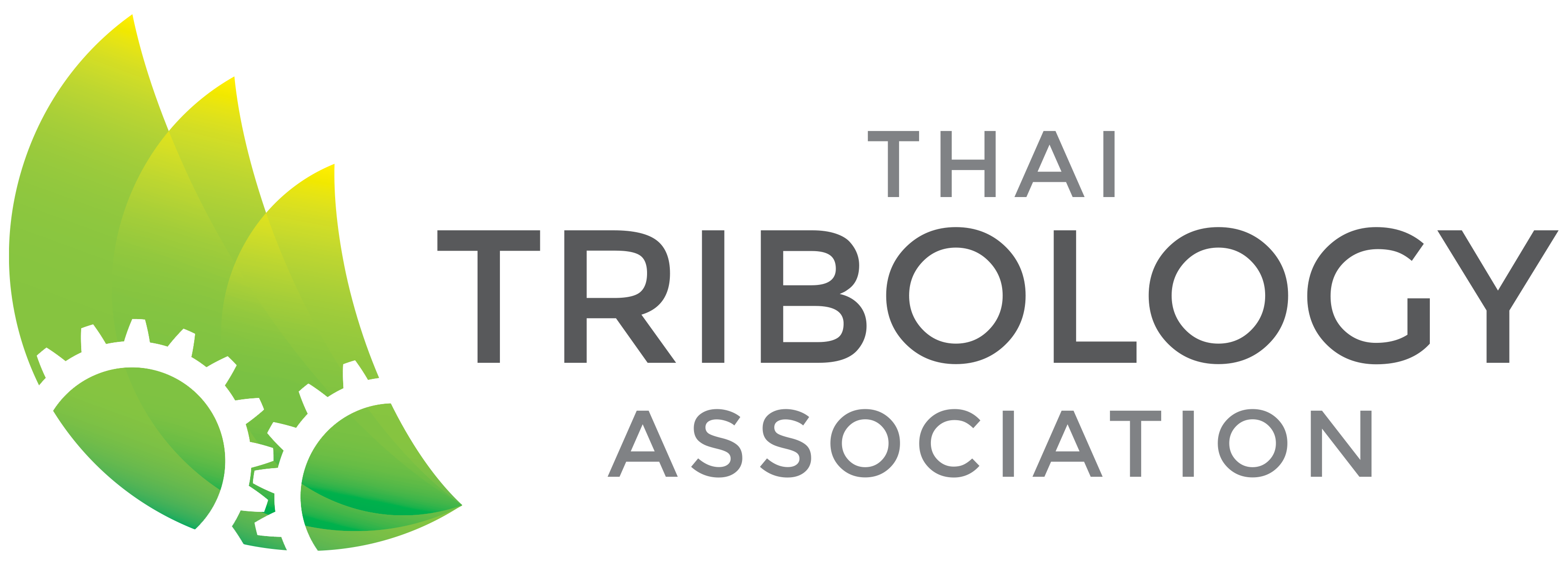Oil Additive Technology
สมาคมการสึกหรอและการหล่อลื่นไทย (Thai Tribology Association หรือ TTA) ร่วมกับสมาคมนักไทรโบโลยีและวิศวกรการหล่อลื่นแห่งประเทศสหรัฐอเมริกา (ประเทศไทย) (The Society of Tribologists and Lubrication Engineers Thailand หรือ STLE Thailand) และ ศูนย์เครื่องมือวิจัยวิทยาศาสตร์และเทคโนโลยี (Scientific and Technological Research Equipment Centre หรือ STREC) จุฬาลงกรณ์มหาวิทยาลัยจะมีการจัดสัมมนาหัวข้อ “Oil Additive Technology” บรรยายโดย คุณวิชัย ศรีมงคลกุล ซึ่งเป็นผู้เชี่ยวชาญทางด้าน Advanced Lubrication Technology จากประเทศสหรัฐอเมริกามากกว่า 20 ปี เพื่อเผยแพร่ข้อมูลเกี่ยวกับเทคโนโลยีของการเลือกใช้และการผสม Oil Additives ให้เหมาะสมกับการใช้งานในอุตสาหกรรมแต่ละประเภท โดยประโยชน์ของเทคโนโลยีดังกล่าวจะช่วยให้วิศวกรสามารถเพิ่มประสิทธิภาพและอายุการใช้งานของเครื่องจักร รวมไปถึงช่วยลดต้นทุนในกระบวนการผลิต ซึ่งผู้เข้าร่วมงานสัมมนาและผ่านการสอบจะได้รับ “Oil Additive Technology Certificate” จาก STLE Thailand โดยผู้เข้าร่วมงานสัมมนาที่ลงทะเบียนและชำระค่าลงทะเบียน 20 ท่านแรก จะได้รับสิทธิประโยชน์ในการเป็น สมาชิก STLE Thailand เป็นระยะเวลา 1 ปี ฟรี
Abstract
Today lubrication technology has evolved from advanced research into a more simple practical additive blending. Each original oil additive manufacturer has developed their own technology for oil blending company to easily make their lubricants as OEM. However, all of the additive technologies come from the same basic understanding of chemistry components such as Zinc, Phosphorus technology. To blend additives to make a new lubricant, oil blender simply blend the formulated additives into the designated base oil at the right viscosity based on the formula that was designated by the additive companies. There is no high level technology involved in this process but a similar way of making a hot chocolate in a cup. This is why today oil company has no knowledge of how each additive relates and functions to the base oil in an effort to become a more metal protection. When end user has oil problems, the oil supplier can only advise them to change with new oil. No better explanation as it could involve more risk and liability afterward.
With market economy, the new lubricant can get even worse as customer demand to purchase the cheapest available oil price that they can get. Customer has more buying power than ever to dictate the lowest price available among plenty of oil suppliers. So the new oil supplier can only survive by selling their lubricant at the lowest price possible with bare minimal oil additives in order to sustain the business. Then, customer ends up getting what they are paying for it. They buy it cheap, they will get the cheap and premature breakdown lubricant for the lowest price. This means today new oil contains a very minimal oil additive or not enough to last longer. This causes lubricant to have poor performance and less protection for the machinery.
To refortify the oil additives to the lubricant after market, requires many technique and awareness of the side effect to occur such as oil cleanliness and compatibility issues among base oil and current additives. The lubricant must be clean and free of water and oil oxidation prior to additive refortification process or else the supplemental additives will cause the oxidation to back fire to more oxidation by products. Therefore, the level oil cleanliness is a primary concern for additive refortification. The compatibility of additive refortification is another problem of causing the new additive not to emulsify and dissolve in the lubricant as they may have poor chemistry reacting among base oil and new additives. This compatibility must be checked to confirm its conformity before additive refortification process. Successful additive refortification can lead to a longer oil life extension as well as machinery reliability improvement. This know how will not normally reveal from oil company due to its conflict of interest.
กำหนดการสัมมนา (Day 1)
วันพฤหัสบดีที่ 10 มกราคม 2562 เวลา 08.30 – 16.00 น.
ณ ห้องประชุม 3 ชั้น 3 สำนักงานวิทยทรัพยากร (หอสมุดกลาง) จุฬาลงกรณ์มหาวิทยาลัย
|
Time |
Topics |
|
08.30 – 09.00 |
Registration |
|
09.00 – 09.30 |
Oil Additive Technology |
|
09.30 – 10.00 |
Industrial Oil Additives |
|
10.00 – 10.30 |
Break |
|
10.30 – 11.00 |
Internal Combustion Oil Additives |
|
11.00 – 11.30 |
Zinc Additives |
|
11.30 – 12.00 |
Gear Oil Additives |
|
12.00 – 13.00 |
Lunch |
|
13.00 – 14.00 |
Metal Working Additives |
|
14.00 – 14.30 |
Sulfurized Additives |
|
14.30 – 15.00 |
Break |
|
15.00 – 15.30 |
Oil Based Metal Working Fluids |
|
15.30 – 16.00 |
Water Based Metal Working Fluids |
กำหนดการสัมมนา (Day 2)
วันศุกร์ที่ 10 มกราคม 2562 เวลา 08.30 – 16.00 น.
ณ ห้องประชุม 3 ชั้น 3 สำนักงานวิทยทรัพยากร (หอสมุดกลาง) จุฬาลงกรณ์มหาวิทยาลัย
|
Time |
Topics |
|
08.30 – 09.00 |
Registration |
|
09.00 – 09.30 |
Base Oils |
|
09.30 – 10.00 |
Mineral Oils |
|
10.00 – 10.30 |
Break |
|
10.30 – 11.00 |
Oil Deterioration |
|
11.00 – 11.30 |
Oil Oxidation |
|
11.30 – 12.00 |
Oil Contamination |
|
12.00 – 13.00 |
Lunch |
|
13.00 – 14.00 |
ASTM Standard Testing |
|
14.00 – 14.30 |
Performance Additive Testing Equipment |
|
14.30 – 15.00 |
Break |
|
15.00 – 15.30 |
Oil Additives Technology Test |
|
15.30 – 16.00 |
Oil Additives Technology Certifications and Awards |
การลงทะเบียนสัมมนา
ท่านสามารถลงทะเบียนเข้าร่วมการสัมมนาออนไลน์ได้ที่ https://goo.gl/forms/x44aZ77iqUWMx0Bc2 และชำระค่าลงทะเบียน 5,500 บาท โดยการโอนเงินเข้าบัญชี
สมาคมนักไทรโบโลยีและวิศวกรการหล่อลื่น ธนาคารกสิกรไทย จำกัด (มหาชน) ประเภทออมทรัพย์ เลขที่บัญชี 040-1-20473-3
กรุณาส่งหลักฐานการโอนเงินพร้อมระบุชื่อและหน่วยงานที่ [email protected]
หมายเหตุ
- อัตราค่าลงทะเบียนรวมค่าอาหารว่าง อาหารกลางวัน (2 วัน) และภาษีมูลค่าเพิ่ม 7%
- กรุณาลงทะเบียนและชำระเงินค่าลงทะเบียนก่อนวันพฤหัสบดีที่ 3 มกราคม 2562 เพื่อสำรองที่นั่ง เนื่องจากมีจำนวนจำกัด
- ผู้เข้าร่วมการสัมมนาที่ลงทะเบียนและชำระเงิน 20 ท่านแรก จะได้รับสิทธิพิเศษในการเป็นสมาชิกชอง STLE Thailand Chapter เป็นเวลา 1 ปี ฟรี โดยรายละเอียดเกี่ยวกับสิทธิประโยชน์สำหรับการเป็นสมาชิก STLE Thailand นั้นสามารถดูรายละเอียดได้ที่ https://tta.or.th/stle-thailand
ภาพบรรยากาศงานสัมมนา
